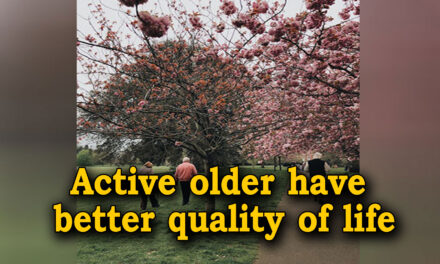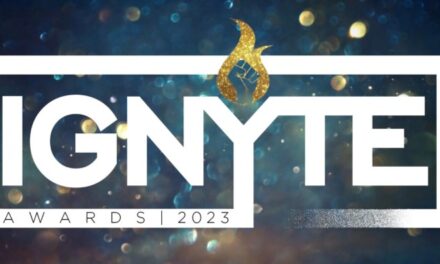Public views of obstacles faced by women in politics and the impact of having a woman president
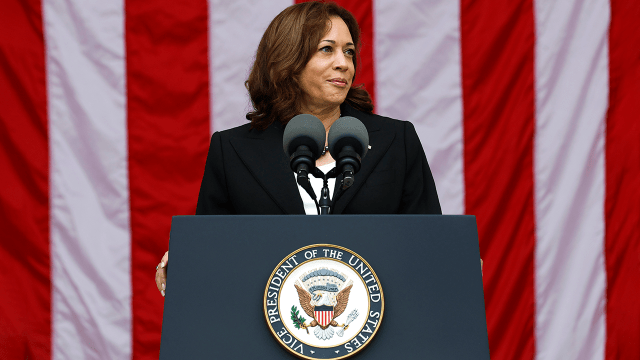
How we did this
Pew Research Center conducted this study to explore Americans’ views about the current state of gender and political leadership, including the obstacles for women running for office and how a woman president might be different from a male president when it comes to leadership traits and the handling of key policy areas.
This analysis is based on two surveys: a survey of 5,057 U.S. adults conducted July 17-23, 2023, and a survey of 11,201 U.S. adults conducted July 31-August 6, 2023. Everyone who took part in these surveys is a member of the Center’s American Trends Panel (ATP), an online survey panel that is recruited through national, random sampling of residential addresses. Address-based sampling ensures that nearly all U.S. adults have a chance of selection. The survey is weighted to be representative of the U.S. adult population by gender, race, ethnicity, partisan affiliation, education and other categories. Read more about the ATP’s methodology.
Read more about the questions used for this report, the methodology for the July 17-23 survey and the methodology for the July 31-August 6 survey.
Terminology
All references to party affiliation include those who lean toward that party. Republicans include those who identify as Republicans and those who say they lean toward the Republican Party. Democrats include those who identify as Democrats and those who say they lean toward the Democratic Party.
For the most part, Americans don’t think a woman president would do better or worse than a man when it comes to key leadership traits or the handling of various policy areas.
At the same time, the public sees differences in the way men and women running for higher office are treated by the media. And many think women candidates are punished more than men for showing emotions and having young children at home, among other attributes.
With Kamala Harris serving as vice president and former South Carolina Gov. Nikki Haley vying for the Republican presidential nomination, we asked Americans about their views on:
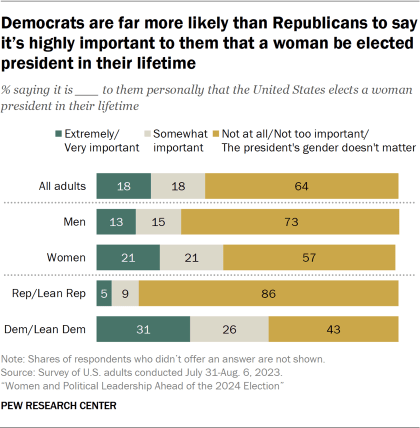
When asked how important it is that a woman be elected president in their lifetime, a relatively small share of U.S. adults (18%) say this is extremely or very important to them. Most (64%) say this is not too or not at all important or that the president’s gender doesn’t matter. These views vary by gender and partisanship.
Related: The Data on Women Leaders
Only one-in-four U.S. adults say it’s extremely or very likely that the United States will elect a woman president in their lifetime. About half (49%) say this is somewhat likely and 26% say it’s not too or not at all likely.
The findings in this report come from two surveys using Pew Research Center’s American Trends Panel. Most of the questions were asked of 5,057 U.S. adults from July 17 to July 23, 2023. The questions about the importance and likelihood of a woman being elected president were asked of 11,201 U.S. adults from July 31 to August 6, 2023.
Other key findings:
Number of women in office
Today, 53% of Americans say there are too few women in high political offices in the United States. This is down from 59% in 2018.
Looking ahead, 52% say that, as more women run for office, it’s only a matter of time before there are as many women as men in these positions. Some 46% say men will continue to hold more of these positions in the future. For more detail on views of the state of gender and political leadership, refer to Chapter 1 of this report.
Why there are fewer women than men in office
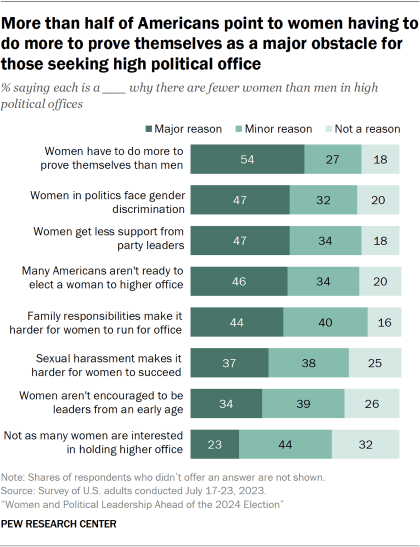
Many Americans see several major reasons why there are fewer women than men in high political offices, such as:
- Women having to do more to prove themselves than men (54%)
- Gender discrimination (47%)
- Women getting less support from party leaders (47%)
- Many Americans not being ready to elect a woman to higher office (46%)
- Family responsibilities (44%)
For more detail on views of the obstacles for women seeking high political office, refer to Chapter 2 of this report.
How the media treats men and women running for office
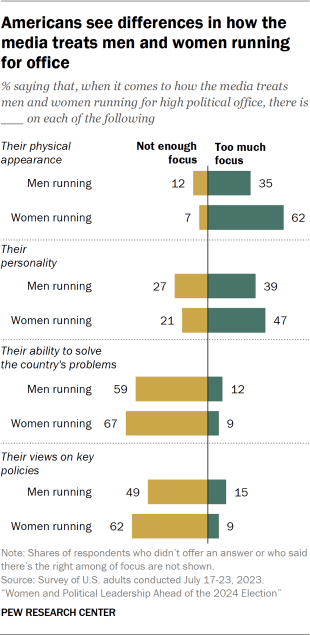
Physical appearance
Overall, 62% of Americans say the media focuses too much on the physical appearance of women running for high elected office. Fewer (35%) say there’s too much focus on men’s appearance.
Views on key policy issues
In turn, 62% say there’s not enough focus on women candidates’ views on key policy issues, compared with 49% who say the same about how the media treats men running for office.
Candidate traits and gender
Showing emotions and having young children at home
By wide margins, more see showing emotions and having young children at home as disadvantages for women than for men seeking high political office.
- A majority (58%) say showing emotions hurts a woman’s chances of getting elected; 33% say this hurts a man’s chances.
- While 48% see having young children at home as a disadvantage for women candidates, just 7% see it as a disadvantage for men.
Other traits
Americans are also more likely to say not having experience in elected office and being older than 70 hurts women than to say it hurts men running for office, though majorities say these factors hurt both women and men.
Being physically attractive is the only trait we asked about that is seen by majorities as helping both women (66%) and men (60%).
Candidate race and gender
Most Americans (65%) think voters are more likely to support a candidate if the candidate is a White man. A smaller share say voters are more likely to support a candidate who is a White woman, though being a White woman is still seen as more likely to help than hurt a candidate’s chances (36% vs. 25%).
In contrast, the public sees being a Black man or woman, a Hispanic man or woman, or an Asian man or woman as more hurtful than helpful with voters. In each case, more see being a woman than see being a man as a disadvantage for candidates.
How a woman president might be different than a man
Half or more say that a woman president would be neither better nor worse than a man or that a president’s gender doesn’t matter when it comes to their handling of various policy areas or to several leadership traits.
Still, more than a third say a woman president would do better than a man when it comes to:
- Handling education (46%)
- Handling health care (45%)
- Working out compromises (39%)
- Maintaining a respectful tone in politics (37%)
For more detail on views of how a woman president might be different from a man, refer to Chapter 3 of this report.
Differences by gender and party
These survey findings often vary by gender and partisanship. And in some cases, there are gender differences within each party. Some examples of how views vary by:
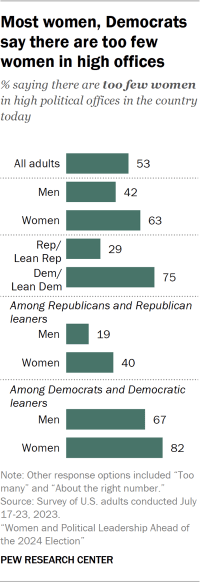
- Gender: Women are more likely than men to say there are too few women in high political offices in the U.S. today (63% of women and 42% of men say this). Women are also more likely than men to say most factors we asked about – such as gender discrimination, women having to do more to prove themselves than men, and sexual harassment – are major obstacles for women in politics.
- Partisanship: 31% of Democrats and Democratic leaners say it is extremely or very important to them that the U.S. elects a woman as president in their lifetime. Just 5% of Republicans and Republican leaners say the same. Democrats are also more likely than Republicans to say a woman president would do better than presidents who are men in when it comes to each of the policy areas and leadership traits we asked about.
- Gender within each party: Republican women are about twice as likely as Republican men to say there are too few women in high political offices in the country today (40% vs. 19%). Majorities of Republican (59%) and Democratic (57%) men say that, as more women run for high political office, it is only a matter of time before there are as many women as men in these positions. About half of Republican women (49%) and 45% of Democratic women think this will happen.


